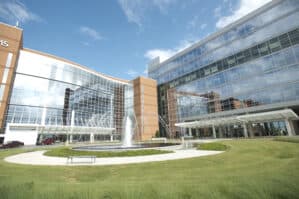What Makes UAMS So Special?
Unique Opportunities

UAMS Medical Center in Little Rock
The UAMS Department of Psychiatry offers a number of unique opportunities to residents that enhance their education and training, leading them to become excellent and well-rounded psychiatrists. If you’re looking for a variety of conveniently located training sites, a diverse patient population, research opportunities, and a number of different treatment programs, then UAMS is the right place for you. We prioritize resident education by having protected didactic lecture time every week, during which residents are free from rotation responsibilities. We also frequently evaluate rotation responsibilities to ensure that residents are there to learn, not just do scut work. Residents also enjoy a number of social activities to enhance comradery, such as lunch together before weekly didactics , an annual retreat and a holiday party. Follow the links below to learn about what more we have to offer.
Electroconvulsive therapy – Electroconvulsive therapy (ECT) is one of the FDA approved procedures in psychiatry. It is approved for multiple acute psychiatric illnesses, including depression, mania, and psychosis. Residents learn the indications, pre-procedural work-up and administrative steps of ECT. They observe improvements in patients over the course of initial series treatment and maintenance therapy. There is an average of 10-15 treatments per day, three times a week. Residents can also receive additional training through elective rotations.
Transcranial magnetic stimulation (TMS) involves the use of a very short pulsed magnetic field to stimulate nerve cells in the brain. With TMS, there is none of the side effects commonly associated with antidepressant medication and patients remain awake and alert throughout the treatment. TMS is approved by the U.S. FDA for the treatment of depression and has shown to be effective in helping those patients who have failed to benefit from medications alone. TMS experience is available to residents through elective rotations.
The PRI Women’s Mental Health program focuses on the treatment of the unique mental health issues affecting women, including peripartum and postpartum mood disorders and psychosis, as well as addiction. This program also offers research opportunities for residents through the Resident Academic Track.
The Resident Academic Track (RAT) introduces residents to a broad array of clinical research, provides mentorship, and encourages the development of an individualized academic growth plan for residents. A novel aspect of the RAT at UAMS relative to many of the more formally described and marketed “resident research tracks” is the recognition that academic careers are not solely dependent on the development of independent research careers. Rather, careers in academic medicine involve teaching, professional presentations, scholarly and critical literature reviews, collaborative research endeavors as co-investigators, and a broad appreciation of research methodology. Residents apply for the RAT at the end of their PGY-1 year and participate in the PGY-2 year and beyond.
The Brain Imaging Research Center (BIRC), located within PRI, conducts several research projects to better understand various aspects of human behavior including addiction, decision making, and the effects of trauma. Here is a complete list of the vast array of research projects currently under way.
The center includes an Image Processing and Analysis Lab (IPAL), a 3Tesla MRI system and an MRI simulator. Residents may join research projects currently being conducted or propose new project ideas, especially if partaking in the RAT.
The PRI Center for Addiction Services and Treatment (CAST) utilizes buprenorphine, methadone and individual and group therapies to treat opioid addition. The multidisciplinary team is involved in each patient’s case. Residents work in this clinic during their PGY-2 year while on the Addictions rotation. There is opportunity for additional exposure during electives as well as fellowship training.
The goal of PRI Child Diagnostic Unit (CDU) is to provide child- and family-centered care that focuses on clarification of diagnoses for which individualized treatment plans are then developed. The unique characteristics of this program are the average 28-day length of stay and the initial complete medication washout that allows evaluation of baseline symptoms so that appropriate treatment can be started. The interdisciplinary team of psychologists, social workers, speech and language therapists, occupational therapists, nurses and doctors all provide care for each patient throughout admission. Residents have the opportunity to rotate on the CDU as an elective. They also spend several days on the unit as part of their experience at the Child Study Center during their PGY-2 year.
External moonlighting – External moonlighting is a way for residents to gain more clinical experience during their residency years while also supplementing the ACGME stipend. It is available after the completion of intern year and requires obtaining an Arkansas medical license.
